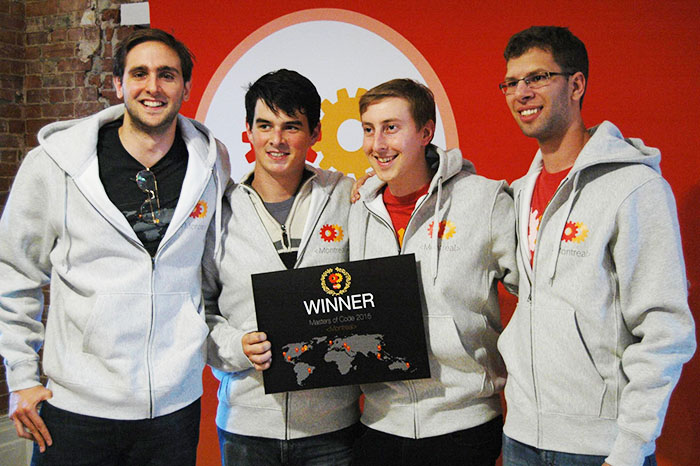“Develop the greatest digitally connected application [or] solution that will profoundly alter your connected life.” This was the problem presented at the MasterCard Masters of Code hackathon this weekend. Stretching from Saturday to Sunday afternoon, the challenge attracted roughly 100 developers, designers, and tech enthusiasts to Notman House, Montreal’s hub for techonlogy, where the 24-hour event took place.
Montreal’s own hackathon brought together the members of its tech scene, many of whom were affiliated with McGill, although some participants came from from Ottawa. All attendees, however, shared a passion for using technology in creative and innovative ways.
“It’s like building LEGO with your friends,” said McGill Civil Engineering alumnus Jean Amiouny.
An all-expenses paid trip to Silicon Valley was on the line for first place. Despite this, the atmosphere remained relaxed and collaborative.
“This is actually a [pretty] mellow place,” explained Matt Wright, a representative of AngelHack, an organization that also runs hackathons. “Last week, we were in Latin America and it was a very excited atmosphere. Here it’s more ‘slow and steady wins the race.’”
The projects that came out of the hackathon ranged from the educational, to the humanitarian, to the simply practical. This included a financial education app for kids, a loyalty platform for small businesses, and a cost-splitting app that took the grand prize.
Peng Liu, a Computer Science student from the University of Ottawa explained that the opportunity to connect with others who are equally as passionate about development is a major draw for participants.
“I think [my] most memorable experience […] was around 2 to 3 a.m.,” Liu said. “I was talking to another hacker, and we had this two-to-three hour talk about bitcoins. That’s [something] that will only ever happen at a hackathon; finding yourself up at 2, 3, 4, a.m. talking about bitcoin and cryptocurrencies with some random person.”
These types of connections between developers will often lead to profitable hackathon teams. The winning project, FareShare, came from a group who met at a party close to the day of the hackathon.
“I knew [my teammate,] Harold [Day] from McGill Engineering,” said Andrew Doyle, one of the members of the winning team. “We used to volunteer together with the Engineering Undergraduate Society (EUS), and so we decided we wanted to do something at the hackathon. We ended up at a friend’s party, and I started talking to some developers there who are now friends of mine, and we signed up on the spot. And it turns out that I knew one of them from McGill [….] We all came together pretty quickly and haphazardly, but it all worked out.”
[URIS id=36786]
Their team’s app epitomizes the collaborative spirit of hackathons, letting friends split costs.
“If you’re going on a ski trip, someone’s buying gas, and someone else is buying food, and someone else is paying for drinks, and everyone owes everyone else money,” Dan Greencorn, one of the team’s developers, explained. “We’re using MasterCard’s API to let everyone record what they buy, and then split the cost after the trip.”
The runners-up also have a McGill background, featuring two current students and two alumni. Their project took a more humanitarian approach to economic transactions.
“Our app translates your regular daily spending into automated donations to charity,” Bogdan Istrate, a McGill alumnus and one of the designers, explained.
These automatic donations make it convenient for users to give back.
“You pick whichever charity you want to donate, then whenever you go spend money anywhere like Starbucks or the grocery store, you set up a percentage that you want to donate, so if you spend $500 and set the app to 1 per cent, then you also donated $5 to whatever organization you selected from our app,” Xiaolei Liu, another McGill Master’s student and team member, said .
Each member of the second-place team received a $500 MasterCard gift card, while the winning team received an all-expenses-paid trip to San Francisco to participate in the Grand Finale Masters of Code hackathon.
Additional reporting by Wyatt Dougherty.Photos in slider courtesy of Trep Life








